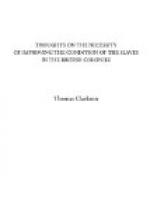the promoters of this alteration never meant to carry
it into effect. It was intended, by making a show
of these laws, to deceive the people of England,
and thus to prevent them from following up the
great question of the abolition. Mr. Clappeson,
one of the evidences examined by the House of Commons,
was in Jamaica, when the Assembly passed their famous
consolidated laws, and he told the House, that “he
had often heard from people there, that it was passed
because of the stir in England about the slave trade;”
and he added, “that slaves continued to be as
ill treated there since the passing of that act
as before.” Mr. Cook, another of the
evidences examined, was long resident in the same
island, and, “though he lived there also since
the passing of the act, he knew of no legal
protection, which slaves had against injuries
from their masters.” Mr. Dalrymple was examined
to the same point for Grenada. He was there in
1788, when the Act for that island was passed also,
called “An Act for the better Protection and
promoting the Increase and Population of Slaves.”
He told the House, that, “while he resided there,
the proposal in the British Parliament for the abolition
of the slave trade was a matter of general discussion,
and that he believed, that this was a principal reason
for passing it. He was of opinion, however, that
this Act would prove ineffectual, because, as Negro
evidence was not to be admitted, those, who chose to
abuse their slaves, might still do it with impunity;
and people, who lived on terms of intimacy, would
dislike the idea of becoming spies and informers against
each other.” We have the same account of
the ameliorating Act of Dominica. “This
Act,” says Governor Prevost, “appears
to have been considered from the day it was passed
until this hour as a political measure to avert
the interference of the mother country in the management
of the slaves.” We, are informed also
on the same authority, that the clauses of this Act,
which had given a promise of better days, “had
been wholly neglected.” In short, the
Acts passed in our different Islands for the pretended
purpose of bettering the condition of the slaves have
been all of them most shamefully neglected; and they
remain only a dead letter; or they are as much a nullity,
as if they had never existed, at the present day.
And as our planters have done nothing yet effectively by law for ameliorating the condition of their slaves, so they have done nothing or worse than nothing in the case of their emancipation. In the year 1815 Mr. Wilberforce gave notice in the House of Commons of his intention to introduce there a bill for the registration of slaves in the British colonies. In the following year an insurrection broke out among some slaves in Barbadoes. Now, though this insurrection originated, as there was then reason to believe, in local or peculiar circumstances, or in circumstances which had often produced insurrections before, the




